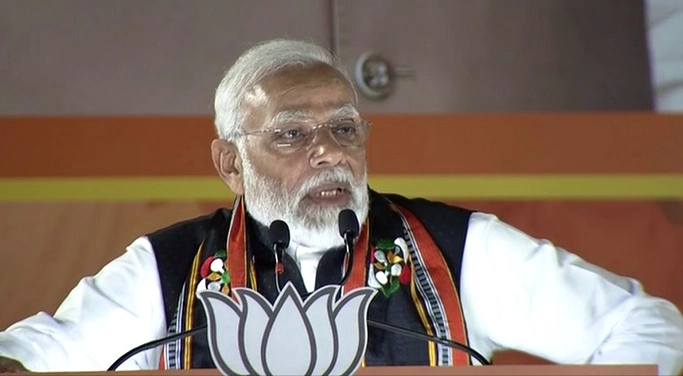

PM Modi speaks to BJP workers after northeast election results are out
It is now clear that Northeast India is riding the saffron wave. Results of the latest assembly elections show that the BJP was the star performer in the states of Tripura and Nagaland, two of the three states then went to polls. In Meghalaya too, the BJP will partner the government, as it has a de facto alliance with the National People’s Party (NPP), which got the maximum 26 seats in the 60-seat assembly.
Already in power in other states in the region—Assam, Manipur and Mizoram– it is evident that the entire northeast has tied their dreams and aspirations with the BJP and its coalition partners. Prime Minister Narendra Modi and his party have clearly won the battle of hearts and minds in a border region, which is India’s spur to Southeast Asia. The northeast is also on the frontlines with China, which has viewed the region as India’s soft underbelly.
There are five bullet points that show why BJP’s political dominance in the northeast is good, and critically important for India’s rise.
First, the polls have generated genuine hope and enthusiasm—a rarity in an era of dystopia– that the pervasive presence of the BJP in the northeast will yield good governance. There are positive expectations that backed by the centre, a local BJP-led government can deliver long-overdue material progress, including healthcare, water, schools, physical as well as digital connectivity. Already focused development of the isolated region, including ever-growing connectivity nodes has been a major factor in propelling the BJP back to power.
Second, a climate of optimism and opportunities is bound to bolster national security. The turnaround in the psychological ambience will be a sure-shot antidote against the divisive appeal of externally backed violent extremism and separatism. For the first in decades an opportunity has opened up for the permanent eradication of insurgency along India’s northeastern frontiers. It opens the prospects an era of peace and prosperity, which will dock with the idea of Viksit Bharat, or fully developed India by 2047, timed with 100 years of India’s independence.
Third, the latest round of elections will add wings to India’s Act East policy. With double-engine governments in place, the landlocked region can activate international trade with access to ports in Bangladesh, such as Chittagong, Mongla and the upcoming deep-water port of Matarbari.
India has been a major votary for fully developing the Asian highway connecting the northeast with Bangladesh, Myanmar and Thailand. From Thailand, the road can connect to a corridor that ends in Danang in Vietnam. With BJP governments in place, it is expected that the Modi administration will work 24×7 to build over the Brahmaputra, the 19 km long Dhubri-Phulbari bridge. Once this is done, it will structurally draw Bhutan into a giant connectivity network that links the northeast with the 10-nation Association of Southeast Asian Nations (ASEAN).
Fourth, fired by a strong political will of team-BJP, the northeast development will have a major geopolitical dimension. A rising northeast fully integrated with the rest of India will naturally counter China’s attempt to drive and deepen fault lines in the region.
Finally, the impressive showing in the northeast is building a pro-BJP momentum ahead of the 2024 elections. By polling strongly for the saffron party, the people of the region are demolishing the myth that BJP discriminates among religions. Unsurprisingly, in his victory speech on Thursday the Prime Minister said: “Some opposition leaders and their ecosystems have tried hard for decades to perpetuate myths and stick labels at us…In the northeast, too, the BJP is constantly gaining ground in Christian dominated belts.” The possible shift to a pro-BJP mood among India’s other minorities during the 2024 general elections is now on the radar.
Also Read: In Nagaland, women rejoice as voters perch two female MLA’s in state assembly for the first time
In the aftermath of the tragic terror attack that led to the death of many…
India appreciated the Saudi Arabian side for continuing their welfare programmes for almost 3 million…
Kobbi Shoshani, Consul General of Israel to Midwest India, Mumbai on Wednesday condemned the terrorist…
Amjad Ayub Mirza, a political activist from Pakistan-occupied Jammu and Kashmir (PoJK) currently based in…
Following Tuesday's terror attack in Pahalgam that had left Kashmir Valley in deep mourning and…
Prime Minister Narendra Modi's visit to Jeddah saw the signing of several MoUs in various…